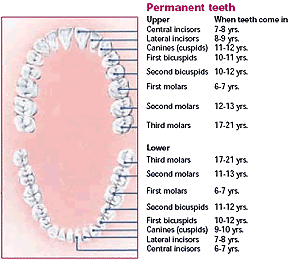
If your child is experiencing soreness, have them gently massage their gums with a soft toothbrush or eat cold foods. Anterior teeth usually erupt with fewer symptoms than adult molars. Fevers aren’t a common symptom of 6-year molars, but low-grade fevers and swelling can occur. When your child’s 6 year molars erupt, symptoms can include headaches, cheek biting and ear or jaw pain, all of which typically last a few days. The 6 year molars represent new growth, meaning they don’t replace any baby teeth. When your child is about 6 years old, their 6 year molars will erupt posterior to (that is, behind ) their 2-year molars. If your child seems bothered, try explaining that losing teeth and growing new ones is a normal part of growing up. Some kids think losing teeth is exciting, while others find it uncomfortable and strange. The remaining 12 teeth, which are canines and molars, are lost between ages 10 and 12.

Typically, kids lose their top 4 teeth and bottom 4 teeth between ages 6 and 8. Genetics play a large role in determining when your child’s baby teeth fall out and their adult teeth come in. If their baby teeth erupted prior to 6 or 7 months, your child will likely start to lose these teeth early too, closer to 5 years old. When will my child lose their baby teeth?īetween the ages of 6 and 12, your child will lose all 20 of their baby teeth. You're Not Alone.6 Year Molars and the Phases of teeth growthĪfter experiencing baby teething and the eruption of the 2-year molars with your little one, you may think that your child’s teething journey is complete-but they still have several phases to complete! All of your child’s baby teeth will be replaced by adult teeth between the ages of 6 and 12, and there are still additional sets of new, permanent teeth that will erupt: the 6 year molars, 12 year molars and wisdom teeth. Let's all vow to ask for help when we need it, and listen out for others. The aim is that by sharing practical advice, raising awareness and breaking down the barriers people face when talking about their mental health, we can all do our bit to help save lives.

That is why The Sun launched the You're Not Alone campaign. Yet it's rarely spoken of, a taboo that threatens to continue its deadly rampage unless we all stop and take notice, now.

It's the biggest killer of people under the age of 35, more deadly than cancer and car crashes.Īnd men are three times more likely to take their own life than women. It doesn't discriminate, touching the lives of people in every corner of society - from the homeless and unemployed to builders and doctors, reality stars and footballers. The boy was also referred for psychological monitoring.ĭr Andréa Gonçalves Antonio, lead author of the report published in 2006, said: "Both our patients were referred to a psychologist, as we believed that the level of emotional stress generated by life events experienced by the patients was a factor in their bruxism."ĮVERY 90 minutes in the UK a life is lost to suicide. He also had an extra tooth growing near the back of his mouth, which had to be removed, before being given a mouthguard for day and night use. The child, who was also in the process of losing milk teeth, had pronounced wear on all primary teeth, the dentists noted.

Mental health disorders don't just affect adults, kids are at risk too.Ĭhildren as young as two are even said to be suffering, with the NHS previously stating one in eight kids has a mental illness.


 0 kommentar(er)
0 kommentar(er)
